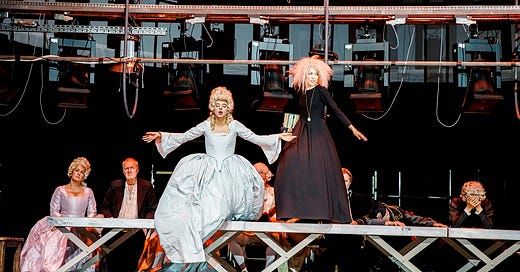Slow Read: Books of Jacob, chapters 25-27
"The new king will be the last king of Poland. Three seas will flood the nation."
Welcome to the Slow Read Along of Olga Tokarczuk, The Books of Jacob. You read along at your pace, and I guide you through the story, characters, and rich historical and cultural context.
This week, Chapters 25 to 27 of V. The Book of Metal and Sulfur and VI The Book of the Distant Country. We meet Moshe Dobrushka and witness the first Partition of Poland that takes Jacob to the court of Austrian Empress Maria Theresa, and takes Jacob’s daughter Eva into the arms of Maria Theresa’s naive enlightened son, Emperor Joseph II.
The Books of Jacob was in mylist of 100 Books to Read Before it is Too Late. I hope you come to love this book as I do.
Olga Tokarczuk won the Nobel Prize in Literature in 2018.
Critics described The Books of Jacob as a “decade-defining book.”
Special Note for New Readers and Subscribers
You can check back and catch up on the whole Slow Read of The Books of Jacob, with hyper-linked lists of all posts, profiled characters, and guides on my Slow Read page.
If you are checking in on the Slow Read of The Books of Jacob for the first time, check these guides to this brilliant novel, the best historical fiction of the twenty-first century, in my humble opinion.
13 January - Tips on how to do the 'slow read' of The Books of Jacob
20 January - An overview of the characters of The Books of Jacob
27 January - Historical context of the 'Other Europe' in The Books of Jacob
We are getting close to the end. There are two more posts to end the novel, and then I will do a wrap-up reflecting on the fantastic journey through history that we have taken.
The Story: Chapters 25 to 27
These three chapters bear witness to the first Partition of Poland, and Jacob’s exile as a baron and fading guru in a Moravian castle, waiting on Empress Maria Theresa of Austria.
In Chapter 25 there are nineteen sections which take us to the end of the Book of Metal and Sulfur. It begins with Yente in the cave, cared for by her great-granddaughter Pesel. Yente sees Nahman pleading for Jacob’s forgiveness, and Jacob fuming impotently in his prison cell. Kossakowska sours in grief following the death of her husband. She enables persecution of the local Jews. Hayah Shorr makes a prophecy:
“The new king will be the last king of Poland. Three seas will flood the nation. Warsaw will be left an island… Jacob will be freed by his greatest enemies, and with his closest allies, he will make an escape to the south.” (p. 275)
She foretells the Partition of Poland and the Frankists’ flight to Germany. When the King dies, a succession crisis ensues that draws in the major European powers (Russia, Austria and Prussia). We see the crisis through the eyes of Kossakowska who plays politics in the election of the King by the szlachta. Jacob seeks patronage from the Russian monarch, Catherine II the Great, who has more influence than Kossakowska over Polish politics.
The crisis releases Hana from Kossakowska’s caressing captivity. She goes to live with Jacob, who maintains a harem of his followers. Her father Tovah confronts Jacob, and breaks with him angrily urging his daughter, who has adopted a Christian name of Hanele, to leave. She does not, and Jacob’s degeneration leads to him urging his male followers to have sex with Hana in order to bind them to Jacob. In 1770 Hana dies from grief after the death of two infants. Her death parallels the dying grief of Drużbacka, who writes a final letter to Chmielowksi that is never received since the priest we met at Rohatyn also dies.
Amid the political disintegration of Poland, Częstochowa is overrun by Polish aristocratic rebels, led by Prince Lubomirski, who develops a sexual fascination with Jacob and Hana’s daughter, Avacha or Eva. Polish soldiers rape Eva. Soon after the fortress of Częstochowa is overrun by Russians. General Bibikov leads the Russian forces that seize the holy site of Polish nationhood. He kindly and politely releases Jacob Frank.
Nahman recalls the end of the years of metal and sulfur.
Jacob, our Lord, says:
“Everyone who seeks salvation must do three things: change his place of residence, change his name, and change his deeds.”
And so we did. We became other people, and we left Częstochowa, at once the lightest and the darkest place. (p. 229)
Chapter 26 begins Book VI, The Book of the Distant Country. There are thirteen sections in which the next generation of Frankists, including Eva come to the fore. The Frankists leave Poland and move to the town of Brunn (Brno) in Moravia. Eva is groomed as an aristocrat. She is attracted to Solomon Dobrushka’s son, Moshe. Moshe is entranced by the philosophy of the enlightenment, becomes a Mason, and changes his name to Thomas von Schönfeld. Despite Thomas and Eva’s attraction, Jacob marries his daughter off for money and a German aristocratic title. He introduces Eva to the Austrian court. Eva and Emperor Joseph II become lovers. Empress Maria Theresa studies Jacob to understand how she can convert the Jews and govern her multinational empire.
In Chapter 27 there are eleven sections which focus on the story of Jacob, Eva and Thomas at the Austrian court. Jacob imagines he can play Empress Maria Theresa. She deploys him to persuade the Ottoman court to strengthen Austrian power in South-Eastern Europe. Jacob sends Nahman, but his mission fails. In Warsaw, a former follower, Golinski, writes to the Austrian court pointing out Jacob’s many frauds. In Brunn, Jacob’s court becomes more degenerate, cult-like and incestuous. Moshe/Thomas’ enlightenment get-rich-quick schemes fail and his rivalry with Jacob deepens. There is not enough money to pay for the splendour. When Empress Maria Theresa dies, Jacob’s political position weakens. His final fall approaches.
Question for Readers
A certain de Kempelen created for his amusement a machine depicting a Turk in an elegant Eastern costume, with a dark face, shiny and polished and quite friendly-looking. The machine sits at the table and plays chess, so well that so far no one has beaten it ….
[Emperor Joseph II:] “If a machine is capable of doing what man can do, and even doing it better than man, then what is man? (p. 179)
Readers of the Burning Archive may recall that early in 2025 I wrote about Walter Benjamin’s Theses on the Philosophy of History, and indeed offered my paid subscribers an audiobook mini of this classic essay - Walter Benjamin on the Angel of History; and his surprising connection to the Burning Archive. There is a surprising connection to The Books of Jacob and de Kempelen’s machine in the first part of this essay.
“The story is told of an automaton constructed in such a way that it could play a winning game of chess, answering each move of an opponent with a countermove. A puppet in Turkish attire and with a hookah in its mouth sat before a chessboard placed on a large table. A system of mirrors created the illusion that this table was transparent from all sides. Actually, a little hunchback who was an expert chess player sat inside and guided the puppet’s hand by means of strings.”
Benjamin, Theses on the Philosophy of History, # I
Benjamin compared the device to the way dogmatic ideas, like historical materialism, are deployed like magical machines to win every argument. With hindsight he was not deceived. The enlightenment monarch Emperor Joseph II was deceived. We frail humans often will ourselves to be deceived by such a system of mirrors.
QUESTION FOR READERS:
Are our machines (e.g. AI) really capable of doing what we can do? Why do we make messiahs of our machines?
Below the paywall, I have some additional notes for paid subscribers on:
Character - Moshe Dobrushka/ Thomas von Schonfeld
Context - The Partition of Poland and the Last King of Poland.



